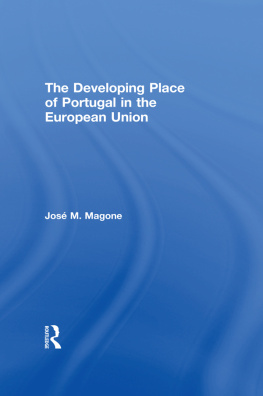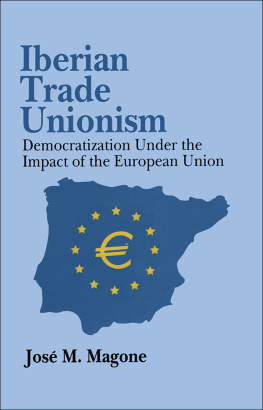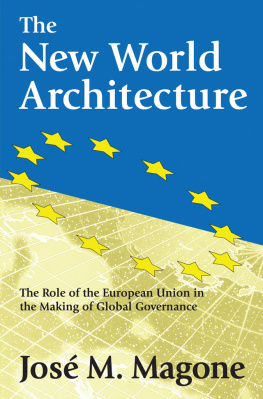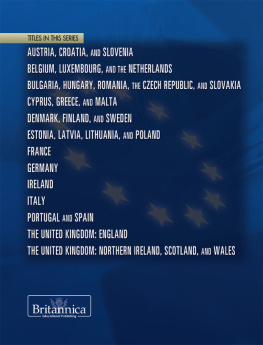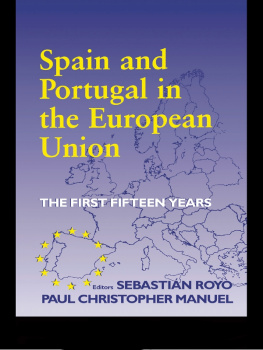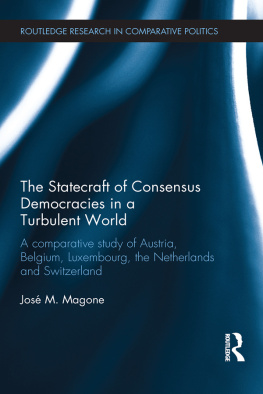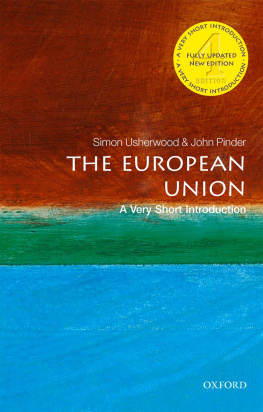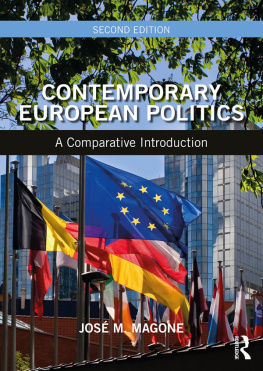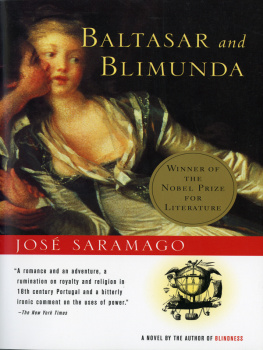José Magone - The Developing Place of Portugal in the European Union
Here you can read online José Magone - The Developing Place of Portugal in the European Union full text of the book (entire story) in english for free. Download pdf and epub, get meaning, cover and reviews about this ebook. year: 2003, publisher: Routledge, genre: Politics. Description of the work, (preface) as well as reviews are available. Best literature library LitArk.com created for fans of good reading and offers a wide selection of genres:
Romance novel
Science fiction
Adventure
Detective
Science
History
Home and family
Prose
Art
Politics
Computer
Non-fiction
Religion
Business
Children
Humor
Choose a favorite category and find really read worthwhile books. Enjoy immersion in the world of imagination, feel the emotions of the characters or learn something new for yourself, make an fascinating discovery.
- Book:The Developing Place of Portugal in the European Union
- Author:
- Publisher:Routledge
- Genre:
- Year:2003
- Rating:4 / 5
- Favourites:Add to favourites
- Your mark:
- 80
- 1
- 2
- 3
- 4
- 5
The Developing Place of Portugal in the European Union: summary, description and annotation
We offer to read an annotation, description, summary or preface (depends on what the author of the book "The Developing Place of Portugal in the European Union" wrote himself). If you haven't found the necessary information about the book — write in the comments, we will try to find it.
José Magone: author's other books
Who wrote The Developing Place of Portugal in the European Union? Find out the surname, the name of the author of the book and a list of all author's works by series.
The Developing Place of Portugal in the European Union — read online for free the complete book (whole text) full work
Below is the text of the book, divided by pages. System saving the place of the last page read, allows you to conveniently read the book "The Developing Place of Portugal in the European Union" online for free, without having to search again every time where you left off. Put a bookmark, and you can go to the page where you finished reading at any time.
Font size:
Interval:
Bookmark:
in their pursuit of new linguistic frontiers
muda-se o ser, muda-se a confiana;
todo o mundo composto de mudana,
tomando sempre novas qualidades.
diferentes em tudo da esperana;
do mal ficam as mgoas na lembrana,
e do bem se algum houve as saudades.
- vi
| BE | Bloco de Esquerda/Block of the Left |
| CAP | Common Agriculture Policy |
| CDS/PP | Centro Democratico Social-Partido Popular/Democratic Social Centre-Peoples Party |
| CDU | Coligao Democrtica Unitria/Democratic Unitary Coalition |
| CFP | Common Fisheries Policy |
| CGTP-In | Confederao Geral dos Trabalhadores Portugueses-Intersindical/General Confederation of Portuguese Workers-Intersindical |
| CIP | Confederao da Industria Portuguesa/Confederation of Portuguese Industry |
| CPLP | Comunidade de Paises de Lingua Portuguesa/Community of Portuguese Speaking Countries |
| CSF | Common Support Framework |
| DGAC | Direcco Geral de Assuntos Comunitrios/General-Directorate for Community Affairs |
| EC | European Community |
| EIA | Environmental Impact Assessment |
| EMU | Economic and Monetary Union |
| EP | European Parliament |
| EU | European Union |
| IMF | International Monetary Fund |
| MNE | Ministrio dos Negcios Estrangeiros/Ministry of Foreign Affairs |
| NATO | North Atlantic Treaty Organization |
| OECD | Organization for Economic Cooperation and Development |
| PRD | Partido Renovador Democratic/Democratic Renewal Party |
| PS | Partido Socialista/Socialist Party |
| PSD | Partido Social Democrata/Social-Democratic Party |
| REPER. | Representao Permanente/Permanent Representation |
| SEA | Single European Act |
| SEM | Single European Market |
| UN | United Nations |
| UGT | Unio Geral dos Trabalhadores/General Union of Workers(P) |
| TEU | Treaty of the European Union/Maastricht Treaty |
Font size:
Interval:
Bookmark:
Similar books «The Developing Place of Portugal in the European Union»
Look at similar books to The Developing Place of Portugal in the European Union. We have selected literature similar in name and meaning in the hope of providing readers with more options to find new, interesting, not yet read works.
Discussion, reviews of the book The Developing Place of Portugal in the European Union and just readers' own opinions. Leave your comments, write what you think about the work, its meaning or the main characters. Specify what exactly you liked and what you didn't like, and why you think so.

